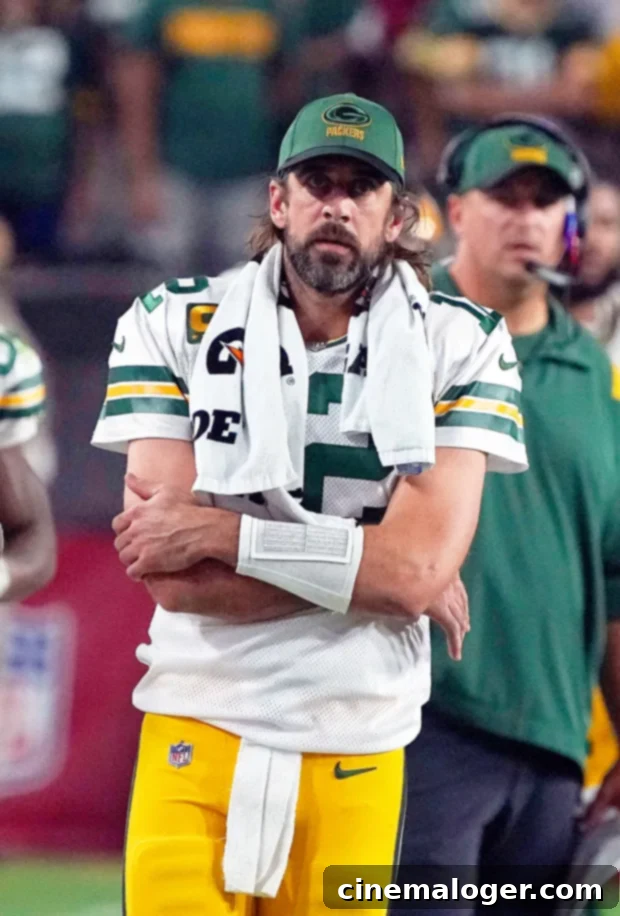Aaron Rodgers’ Vaccine Deception Ignites Fiery Debate on ‘The View’
The esteemed co-hosts of ABC’s flagship talk show, The View, delivered a strong rebuke to Green Bay Packers Quarterback Aaron Rodgers, following revelations about his undisclosed vaccination status and subsequent positive COVID-19 test. The controversy, which erupted in early November, saw the veteran NFL player face intense scrutiny for what many perceived as a deliberate attempt to mislead the public and his teammates regarding his immunization against the virus. The episode, which aired on Friday, November 5, became a significant platform for discussing accountability, public health, and the responsibilities of prominent sports figures in an ongoing pandemic.
The discussion was spearheaded by Joy Behar, who did not hold back in her criticism of Rodgers. Her fellow co-hosts, Sara Haines, Sunny Hostin, and Ana Navarro, all joined in to lambaste the 37-year-old quarterback for his lack of transparency. The outrage stemmed from Rodgers’ earlier statement in August, where he told reporters he was “immunized” when asked about his vaccine status. This statement was later revealed to be deceptive after he tested positive for COVID-19 on Wednesday, November 3, confirming he had not received any of the approved mRNA vaccines.
Joy Behar’s Scathing Critique: “Typhoid Mary” in the Huddle
The segment on The View began with a clip of Rodgers’ now-infamous “immunized” comment, followed by ESPN’s Steven A. Smith, who bluntly labeled the player a “liar.” Joy Behar then took the floor, emphasizing the profound irresponsibility of an unvaccinated individual participating in a high-contact sport like football. Behar drew a stark and memorable parallel, stating, “The NFL says that they’re investigating whether Rodgers violated protocols, but let me say, the guy’s in a huddle six days a week, breathing on people, and directly exposing his teammates to covid. Does ‘Typhoid Mary’ ring a bell anybody? It’s not a job where you’re away from people. You’re right on top of each other in that game.”

Behar’s “Typhoid Mary” comparison resonated deeply, highlighting the severe public health implications of an individual knowingly carrying a contagious disease while engaged in activities that facilitate its spread. Her argument underscored the unique nature of professional football, where players are in constant, close physical contact, making it an environment particularly susceptible to viral transmission. The co-host questioned not only Rodgers’ personal decision but also his judgment in a leadership role, suggesting a profound disregard for the well-being of those around him, including his own teammates, coaches, and support staff. This sentiment captured the frustration felt by many who believed public figures had a heightened responsibility during a global health crisis.
The Ethics of Deception: Kyrie Irving vs. Aaron Rodgers
Sunny Hostin expanded on the discussion by drawing a comparison between Aaron Rodgers and NBA player Kyrie Irving, another high-profile athlete who opted not to get vaccinated. However, Hostin pointed out a critical distinction: Irving had been consistently upfront about his unvaccinated status, even facing consequences such as being benched by his team for his decision. Rodgers, conversely, chose a path of obfuscation, publicly claiming he was “immunized” and stating he wouldn’t judge unvaccinated teammates, only for it to be revealed by NFL Media that he was, in fact, unvaccinated. This difference, Hostin argued, highlighted a significant ethical breach on Rodgers’ part.
Sara Haines further amplified this point, strongly refuting the notion that getting vaccinated is solely a personal decision with no external consequences. She argued that deceiving others about one’s vaccination status directly jeopardizes their health and safety. “If you are lying to me, you’re putting me at risk to make a personal decision—which we keep talking about—a personal decision about my life,” Haines asserted. Her statement underscored the collective responsibility inherent in public health measures, especially in close-knit environments like a professional sports team. The act of misleading, she implied, transforms a personal choice into a communal risk, eroding trust and undermining collective efforts to contain the pandemic.
“Sneaky” vs. “Lying”: A Nuance in Deception?
Guest co-host Paula Faris offered a slightly different perspective, attempting to draw a distinction between an outright lie and a deceptive response. While not excusing Rodgers’ behavior, Faris suggested he hadn’t “lied” in the strictest sense but rather had been “sneaky” and “misled everybody.” However, Sara Haines quickly interjected, clarifying, “Intention to mislead is lying.” This exchange highlighted a key debate: does the intent behind a misleading statement make it tantamount to a lie, especially when the consequences are potentially severe?

Faris also pointed out that the NFL itself did not have a vaccine mandate for its players, acknowledging the different protocols unvaccinated players were expected to follow. These protocols included the crucial requirement to divulge their unvaccinated status and to wear masks at all times in team facilities, which Rodgers was reportedly not doing. “You have to wear a mask at all times, which he’s not doing,” she observed. “I just think come out and say you’re not vaccinated.” This highlighted a compliance issue beyond just the initial misleading statement, indicating potential violations of established league guidelines designed to protect players and staff. The consensus among the co-hosts seemed to be that regardless of the NFL’s policy on mandates, honesty and adherence to existing rules were paramount.
The Kaepernick Parallel: Disparate Consequences for Athletes
During the impassioned discussion, Ana Navarro introduced a potent comparison to the backlash faced by Colin Kaepernick for kneeling during the national anthem before games. Navarro drew a sharp distinction between the two situations, stating, “Nobody was going to die from Colin Kaepernick taking a knee.” Her point was that Kaepernick’s protest, while controversial, did not pose a direct physical threat to others, whereas Rodgers’ actions potentially did. This comparison served to highlight what some perceive as a double standard in how the NFL and the public respond to different forms of athlete protest or non-compliance.
Sunny Hostin echoed Navarro’s sentiment, recalling the severe consequences Kaepernick faced – essentially being ostracized from the league. She then demanded similar accountability for Rodgers. “What is the NFL going to do? What are the consequences here? Because the consequences for Colin Kaepernick kneeling and standing up for social justice is that he’s not playing in the league,” Hostin argued. This raised critical questions about fairness, consistency in discipline, and the league’s priorities. The comparison forced a difficult examination of how public figures are judged for their actions, particularly when those actions intersect with social issues versus public health concerns.
The Quarterback’s Unique Responsibility and Lingering Impact
As the segment drew to a close, Sara Haines underscored the gravity of Rodgers’ actions specifically because of his leadership role as a quarterback. “The quarterback is the worst one. You’re supposed to guide your team through everything, and he is lying,” she emphasized. A quarterback is not just a player; they are the on-field general, a strategist, and often the face of the franchise. Their actions and decisions carry significant weight, impacting not only the team’s performance but also its morale and public image. For a leader in such a pivotal position to be perceived as deceptive about a matter of public health amplified the sense of betrayal and disappointment among his critics.
Joy Behar, ever quick with a quip, managed to insert a bit of humor into the serious discussion right before the commercial break. She mused, “The worst thing is it’s really dampening my interest in football,” a sentiment that, while lighthearted, perhaps subtly captured the broader disillusionment many fans felt when star athletes fail to live up to societal expectations. The controversy surrounding Aaron Rodgers and his vaccine status touched upon complex issues of individual freedom, public health responsibility, the ethical obligations of public figures, and the inconsistent application of consequences in professional sports. The fiery debate on The View served as a microcosm of the larger national conversation, reflecting a public increasingly demanding transparency and accountability from those in the spotlight during challenging times.
The incident also brought renewed attention to the broader challenges faced by sports leagues in navigating the pandemic. Balancing player autonomy with team and public safety, implementing effective protocols, and fostering a culture of honesty remain critical as the world grapples with ongoing health crises. Rodgers’ situation became a stark reminder that even the most celebrated athletes are not immune from public scrutiny when their personal choices impact the collective good, and that the repercussions for misleading the public can be swift and severe, both in reputation and potential professional penalties.
